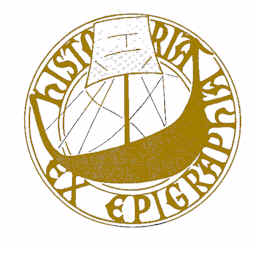
The Epigraphic Society

|
The Epigraphic Society
|
|
|
ESOP will consider scholarly papers concerned with the interpretation of ancient or preserved scripts, symbols, and languages, as well as historical and traditional sources relating to ancient connections between cultures, religions, and philosophies/mythologies. ESOP encourages creative and innovative submissions, but only if a clear rationale and appropriate scientific foundation are provided. Submissions may derive their foundations from a variety of disciplines, including geography, history, archaeology, linguistics, geology, astronomy, archaeoastronomy, biology/ biochemistry and genetics. In addition, ESOP recognizes the value of the oral as well as written heritages of knowledgeable native peoples, and is quite interested in receiving papers in this area when circumstances permit. ESOP has always excluded papers relating to psychic phenomena, dowsing, and proposed evidence of extra-terrestrial encounters. This policy is continued. Research Articles are the usual mechanism by which papers are to be submitted for review and potential publication. Materials sent to ESOP will be handled according to normal academic standards, peer review, and confidentiality. Research Articles, in particular, are expected to show a high degree of craftsmanship and novel proposals. When possible, informed responses to new research ideas will accompany the initial or follow-up article on important topics. Prior publication of a paper in another publication does not exclude submission to ESOP (if permission is obtained to republish), although this may be a factor weighing against acceptance. Research Articles submitted to ESOP are usually limited to 20 double-spaced pages with a maximum of 5 figures or tables, unless expanded space is pre-arranged with the Editors. The submissions will be evaluated on the basis of the novelty, perceived reliability of the data, the quality and style of writing, and expected interest of our readership in the area being considered. It is the authors’ responsibility to obtain written permission to use any copyrighted material which is intended to appear in their submissions. Authors should plan to submit Research Articles, if a topic has been sufficiently well developed, directly to the Editors at the following address: 97 Village Post Rd., Danvers, MA 01923 (e-mail: donalbb@comcast.net). Some members occasionally function as Specialty Editors for ESOP. Authors may choose to have their initial submission go first to one of these individuals, who could facilitate the process and make recommendations concerning publication to the Editors. Authors who have not previously published in ESOP or other major journals are encouraged to prescreen the topic and intended approach through a Specialty Editor, where such an individual is known, prior to formal submission. Although relevant background information is essential to place original contributions in context, papers that primarily review the literature will not be accepted as Research Articles. Review Articles will be occasionally published by ESOP, but these will be by invitation only. ESOP seeks to encourage heuristic debate, discussions, and critical appraisals in high interest areas. Differing viewpoints should be expressed in a scholarly manner and be concerned with the data and its interpretation, not with personalities. Personal attacks and off-the-cuff or unsupported generalizations are not appropriate. Book reviews will not be accepted by ESOP, although a specific topic considered in a book certainly may be the subject of a Research Article, Correspondence, or Forum. As a service to its readers, ESOP will occasionally provide a brief commentary on selected books and important articles from other journals in its Editorial section. Whenever an author posts anything to the Internet, he or she should reasonably expect that it will be read, downloaded, printed out, and perhaps forwarded on a limited basis. The author impliedly grants a limited license to users to utilize the work in this manner. Think about the rights a newspaper editor has to publish a “letter to the editor.” The author of the letter probably did not include a line in the letter giving the editor permission to publish the letter, but anyone who sends such a letter must be presumed to understand that this is what happens to letters to the editor. Authors of letters sent to the Epigraphic Society should be aware that permission to publish the letter in the Society’s publication is implied by the sending unless the writer specifically requests that the correspondence be held confidential. We reserve the right to edit letters for length and clarity. The Editors will have oversight over the review process, and will be responsible for making final decisions over which papers to accept or reject. Specialty Editors, however, may assume major responsibility for Research Articles they have agreed to handle. The Editors will be responsible for arranging for discussions of accepted papers, for selecting correspondence, and for inviting Editorials, Research Reports and Forum participation. Copyright Policy: Material appearing in ESOP may not be reproduced by others without prior written permission of the author(s) and ESOP, in whole or part, electronically or otherwise, Copyrights are retained for the authors who may reproduce their own work as they wish. |
Send mail to donalbb@epigraphy.org
with
questions or comments about this web site.
|